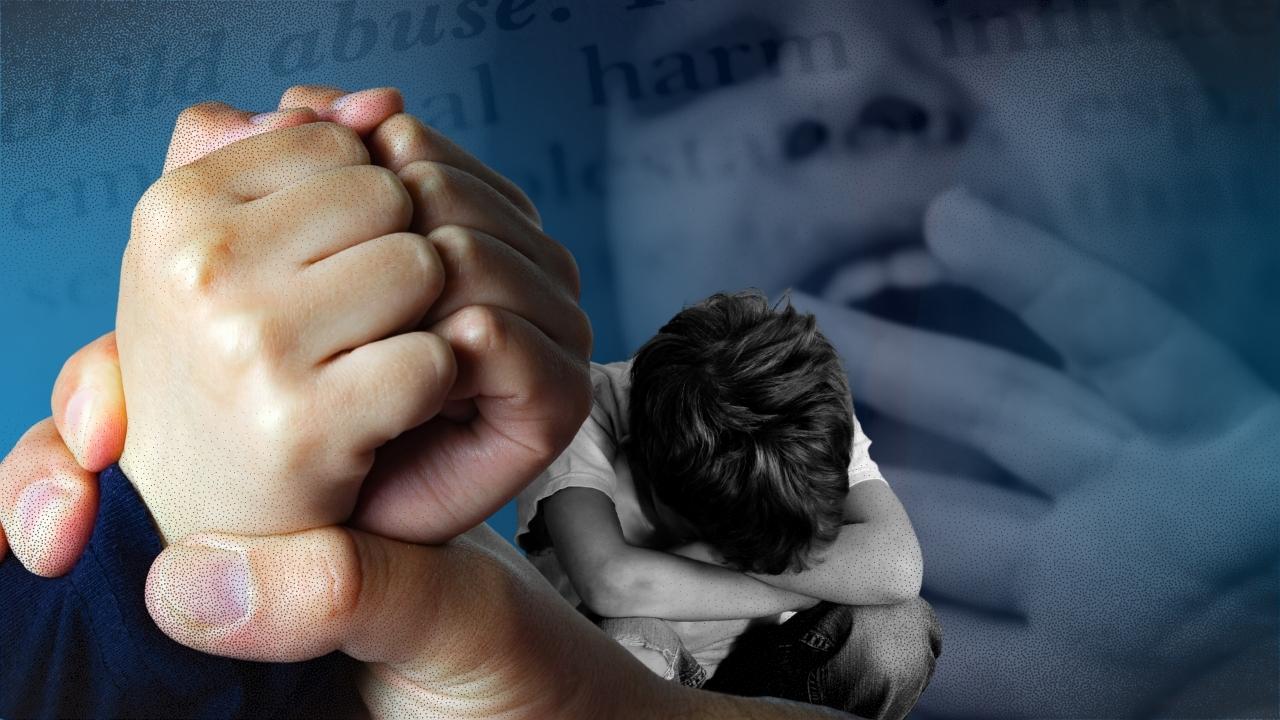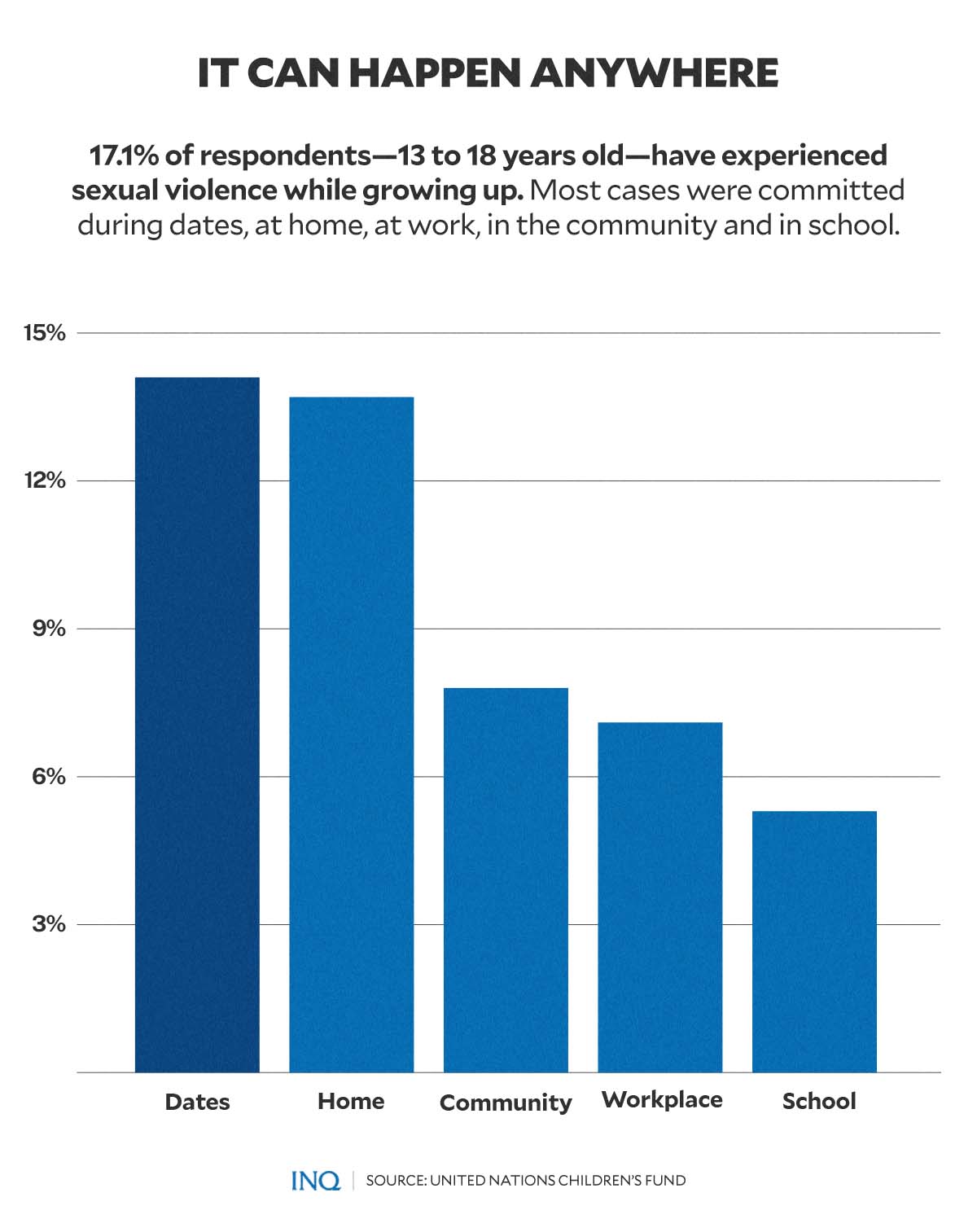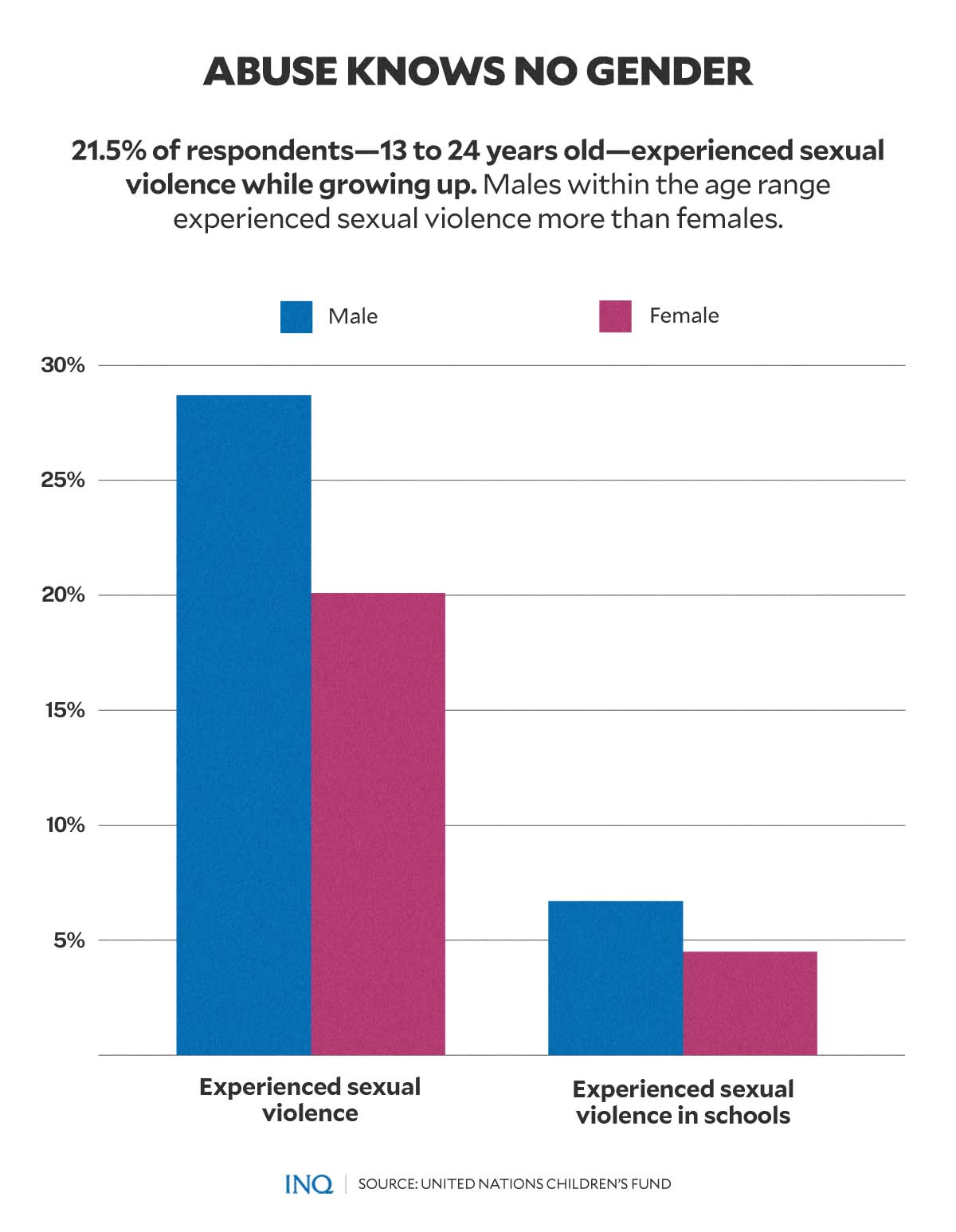Sexual abuse in PH schools: The silent scream of students

FILE PHOTO
MANILA, Philippines—Last week, a social media post went viral on Twitter: Some students of the Bacoor National High School (BNHS) in Cavite province have shared sexual abuse ordeals at the hands of some teachers.
The Aug. 28 post of @eexpresso, which has since gained 37,900 likes and 21,000 retweets, prompted the Department of Education (DepEd) to initiate an investigation, which is now led by its division office in Bacoor City.
Michael Poa, DepEd spokesperson, said the allegations against seven teachers of the BNHS were “very disturbing,” stressing that the department will not take these lightly and will not tolerate abuses in schools.
The teachers, he said, were not given any teaching load while the schools division office is still conducting its investigation on the allegations. The local government, meanwhile, advised the victims to file a complaint.
While Poa said the result of the investigation was expected to be submitted to the regional office on Friday (Sept. 2), he asked for help in encouraging the children to file affidavits “so we would have enough evidence for the cases”.
Article continues after this advertisement‘Not isolated’
Poa said Vice President and Education Secretary Sara Duterte already met with the officials of the department’s Child Protection Unit, directing them to strengthen their presence and programs on the regional, division, and school levels.
Article continues after this advertisementThis, as cases of alleged sexual abuse came only a month since the DepEd asked the National Bureau of Investigation to investigate sexual and emotional violence allegedly committed against students of the Philippine High School for the Arts (PHSA).
Last June 28, Vice World News came out with an in-depth article regarding students of the state-run high school for artists being abused by teachers, staff, and even a fellow student.
RELATED STORY: Children’s nightmare: Violence, death at the hands of people they trust most

GRAPHIC Ed Lustan
In 2020, present and former students of Miriam College, St. Theresa’s College, St. Paul College, Ateneo de Manila University, Marikina Science High School and Quezon City Science High School have also cried against alleged sexual abuse from some employees.
READ: More students raise cry vs harassment
This prompted Sen. Risa Hontiveros to file Senate Resolution No. 168 to seek an investigation on the constant reports of sexual abuse that are allegedly committed by some teachers in schools.
In the resolution, she cited incidents of sexual abuse at the BNHS, St. Theresa’s College in Quezon City, and PHSA: “I’m certain that these are not the only schools who have cases of [sexual] violence.”
Hontiveros earlier filed Senate Resolution No. 26 to seek an investigation on the alleged “culture of abuse, harassment, and violence” at the PHSA, which is located in Los Baños, Laguna.
READ: Hontiveros seeks Senate probe into abuse, sexual harassment by teachers
Silence in darkness
There is a high prevalence of sexual violence in the Philippines, with the findings of the 2016 National Baseline Study on Violence Against Children (NBS-VAC) revealing that 21.5 percent of the respondents—one in five children—experienced sexual abuse.
It said 17.1 percent of children—13 to 18 years old—have experienced sexual violence while growing up: 5.3 percent of the cases was committed in schools, the United Nations Children’s Fund (Unicef) said.
Among victims of sex abuse in schools, 3.3 percent said sexual violence happened when they were 6 to 9 years old, 9.9 percent when they were 10 to 12 years old, 22 percent when they were 13 to 15 years old, and 27.5 percent when they were 16 to 18 years old.
But despite the high prevalence of children who were victims of sexual, physical, and emotional abuse, disclosures were low at 10 percent. The Unicef said most of the victims disclosed their experiences to friends and to some extent, mothers.

GRAPHIC Ed Lustan
Unicef said in the NBS-VAC that only 11.9 percent of victims of sexual abuse discloses the abuse to someone—11.3 percent are males and 12.8 percent are females.
Hontiveros said, often, victims do not report the abuse because their abusers are persons of authority: “How many more of our students are suffering in silence? We cannot let this pass.”
Males experience violence, too
Mark (not his real name) was a Grade 9 student at the BNHS in 2018 when a teacher made him, as well as his boy classmates, wear tight-fitting shorts for a dance requirement in class.
6 Cavite teachers facing probe for ‘grooming’ minors
“He told us to wear cycling shorts and made us dance as part of the performance task [for] his subject,” he told the INQUIRER, stressing that he and his classmates felt awkward but didn’t have enough courage to express opposition.
Based on data from the NBS-VAC, more males within the age of 13 to 24 years old experience sexual violence than females. Out of the 21.5 percent who experienced sexual violence, 28.7 percent was male while 20.1 percent was female.
It said males are more likely to have experienced sexual violence in schools (6.7 percent), compared to females (4.5 percent).
Unicef Philippines’ Faye Balanon had said: “If we look at the numbers, it’s more males who experience sexual violence when most of us assume that the results would tend to lean more towards females.”
The NBS-VAC defines sexual violence as “taking photos or sex videos of being naked or engaging in sexual activities, unwanted touch, forced attempted sex, and forced consummated sex”.

GRAPHIC Ed Lustan
It revealed that 3.2 percent of children and youth experienced forced consummated sex (anal, oral, and/or vaginal) while growing up. The prevalence for males was 4.1 percent, significantly higher than 2.3 percent in females.
The lifetime prevalence of forced consummated sex, or forced penetrative sex, in males was 2.1 percent, double the 1.1 percent lifetime prevalence of forced consummated sex in females.
Effects that last a lifetime
The Australia-based parenting website raisingchildren.net said anyone can be victims of sexual violence and everyone who has experienced it needs help for their physical, psychological and social wellbeing.
This, as the Washington Coalition for Sexual Assault Programs (WCSAP), said the effects of sexual abuse on children and youth depend on the victim’s previous experiences, nature of sexual abuse and the child’s reaction, and responses by people upon disclosures.
It explained that children at different ages express the effects of sexual assault experiences differently:
- Older children overall tend to be more affected because they have greater cognitive awareness of what sexual assault means and how it might impact other aspects of their lives.
- Younger children are primarily focused on their immediate safety and security.
- Anxiety and post-traumatic stress in young children are often expressed by developmental regression, aggression, and distress at separation from a caregiver.
- Older children are more likely to withdraw, avoid situations that are distressing, or shut down emotionally.
- Adolescents who experience severe anxiety may have panic attacks, abuse substances, or engage in self-harming behaviors.
WCSAP stressed that no matter the developmental stage of a child, caregivers are the most important influence on children.

GRAPHIC Ed Lustan
“Making certain that caregivers have accurate information, are supportive to their children, and manage their own emotional reactions in a constructive way is by far the most important factor in helping children. When working with children and caregivers we always need to consider the impact that culture has on the child and caregiver.”
‘Gov’t not doing enough’
When Vice World News narrated the horrors experienced by PHSA students, the Child Rights Network (CRN) said even with the increase of cases of sexual abuse in schools, there has been “no comprehensive and decisive action on the part of the government.”
It said it was appalled by the cases of sexual and physical abuse, especially with the apparent lack of accountability against individuals who committed the crimes against children.
Based on data from Cameleon Association, which fights violence against children, seven million children are sexually abused in the Philippines every year—70 percent are 10 to 18 years old.
CRN said: “The reported crimes against children are crimes of power, with power relations between teachers and house parents in the boarding school tilted against their victims.”
“As these are crimes of power, in most reported cases, victims are robbed of immediate recourse, and carry the unreported trauma way into adulthood,” it said, stressing the need to make schools “safe spaces”.
Lawyer Alberto Muyot, chief executive officer of Save the Children Philippines, had said schools are expected to effectively implement child protection policies to protect children and youth in school from all kinds of violence.
Review of laws needed
CRN said “these heinous acts violate landmark laws that were legislated to protect our children”.
RELATED STORY: Fighting online evil: New law offers hope for PH kids’ protection
These are Republic Act (RA) No. 7610 (Special Protection of Children Against Abuse, Exploitation, and Discrimination Act), 11313 (Safe Spaces Act), and 11648 (End Child Rape Act).
READ: Age of sexual consent now 16: Why this ‘hard-fought’ win is crucial in PH
RA No. 7610 lays down legal mechanisms seeking to “protect and rehabilitate children gravely threatened or endangered by circumstances which affect or will affect their survival and normal development and over which they have no control”.
RA No. 11313 covers all forms of gender-based sexual harassment committed in public spaces, educational or training institutions, workplaces, and online spaces.
One of its provisions sets down the obligations of educational institutions to ensure that appropriate mechanisms are in place to hold perpetrators of gender-based violence accountable.
READ: Gender-based violence: A disease more pervasive than COVID
RA 11648 amended pertinent provisions of Article 266-A of the Revised Penal Code and the anti-rape law of 1997. It sets the age to determine the crime of statutory rape—or the crime that involves sexual contact with a child below the age of sexual consent—to 16, raising it from 12.
This means that students who are below 16 years old and who were sexually abused are victims of rape, even if perpetrators insist that the victim had given consent.
But Rep. Arlene Brosas (Gabriela) stressed that with the increasing cases of students being abused, the Safe Spaces Act should be reviewed, saying that there is a need to ensure that laws are being implemented properly in schools.
“Our policy must ensure that teachers guilty of sexually harassing students are stripped of their professional license and barred from getting near schools. Moreover, we are pushing for a national database of convicted sexual predators to ensure that education institutions are well-informed not to hire sex offenders,” she said
Hontiveros also emphasized that the Safe Spaces Act mandates all schools, whether public or private, to publish grievance procedures and to assign an officer-in-charge who can receive complaints regarding violations of the law.
“Do our schools follow the law?” she said, stressing that sexual harassment cases brought up to educational institutions’ notice must be resolved in a transparent, pro-active, and timely manner in order to ensure the swift delivery of justice.
“It seems like social media has become the last resort of students to report their experiences because they think that school officials are not listening to them or that they are not taking their concerns seriously,” she said.
RELATED STORIES:
PHSA tightens rules after alleged abuses
As COVID shuts down schools, homes become unsafe places for kids